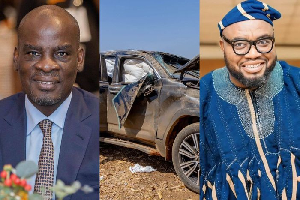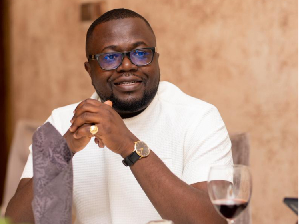A Bosah Chukwuemeka Quote
“He [Chinua Achebe] recalled that he was writing ‘Things Fall Apart’ as Ghana became independent from British rule in 1957. The Pan-Africanism of Ghana’s first leader Kwame Nkrumah was especially influential on Chinua: ‘They were ahead of us [in Nigeria] so we were looking to Ghana to see the path to independence. It was an inspiring moment.’”
SOME FACTS
Nnamdi Azikiwe was the second and last Governor-General of Nigeria, serving in that capacity from 1960 to 1963. He also served as the first President of Nigeria from 1963 to 1966. Like Nkrumah, he attended Lincoln University with other greats such as Thurgood Marshall, Bruce Wright, Langston Hughes, and so on. It has been suggested that it was Azikiwe who recommended Lincoln University to Nkrumah.
INTRODUCTION
In 1957 Ghana became the first nation in sub-Saharan Africa to win its independence from a colonial power (Great Britain). The independence struggle was led by Kwame Nkrumah who became the nation's first Prime Minister. Nkrumah visited Nigeria in 1959. He specifically toured Eastern Nigeria and visited the Eastern House of Assembly at Enugu, on February 3, 1959. Nnamdi Azikiwe used the occasion to give a speech honoring Prime Minister Nkrumah. That speech appears below (both the introduction and speech are taken from the link www.Blackpast.org):
Mr. Speaker, a rare honour is being done to this honourable House today. It is not a common thing for the Head of Government of an independent country to visit the Legislature of another territory, and to accord it the honour of addressing its House of Assembly. We sincerely appreciate this visit and we welcome to this House, with hearts overflowing with joy, Dr. the Honourable Kwame Nkrumah and his galaxy of patriots.
It is a very special pleasure to us, because Dr. Nkrumah is not merely the Prime Minister of Ghana, but is an outstanding pioneer in the fight for the freedom of a sister nation in West Africa. We who are battle-scarred and are now on the verge of attaining our statehood and who eagerly await the great day, 1st October, 1960, when, God willing, our dreams shall be realized, have been especially emboldened by the tenacity of purpose of Dr. Nkrumah and his immortal comrades to make Ghana free. Indeed, Ghana’s independence is the successful accomplishment of their lives’ mission.
Mr. Speaker, may I recall the pertinent milestones in this historic struggle:
On 16th December 1947, Dr. Nkrumah arrived back in his own country, after 12 years of study and preparation in the United States of America and Britain.
On 12th June 1949, Dr. Nkrumah founded the Convention Peoples’ Party.
On 13th February 1951, Dr. Nkrumah left his place of lodging as a ‘special guest of His Majesty’s Government’ and became the Leader of Government Business and ultimately the first Prime Minister of his country.
On 18th December 1956, the British House of Commons passed the Ghana Independence Bill.
On 5th February 1957, this Bill was also passed by the House of Lords.
The Ghana Independence Act received the Royal assent on 7th February 1957.
On 22nd February 1957, the Ghana (Constitution) Order in Council 1957 was made at the Court at Buckingham Palace.
On 6th March 1957, the Sovereign and Independent State of Ghana came into being and its first Parliament was opened.
These are some of the happenings in the life-time of all of us, of which we are living witnesses. But they are not the end. Honourable Members are fully aware of the Pan-African Conference which was held in Accra last year. I have no hesitation in saying that this conference has opened a new chapter in the history of this continent. We are on the eve of great events. A future Federation of independent West African States has made a beginning. It is my earnest hope that the Federation of Nigeria, soon to be independent, will play a worthy part in that larger Federation.
The very diversity of our peoples, and customs and languages, means that we have much to contribute to each other. If we can keep the larger vision in view, if we do not spoil the opportunity that lies before us by petty and inglorious side issues, these African States may yet achieve what the independent and warring States of Europe and the volatile and sometimes undemocratic States of the Americas have never yet accomplished, that is, a unity undreamt-of; and become models of honest and democratic government, which will give hope to all Africa and offer a challenge to the rest of the world.
Mr. Speaker, permit me to add a personal note in this address of welcome to my old friends. It gives me a personal pleasure that is indescribable to have Dr. Nkrumah with us in our House of Assembly and to have him designated Prime Minister of Ghana. I remember so well the days, nearly twenty-five years ago, when, in spite of handicaps, many nationalists aspired and struggled together in order to win freedom for the country which used to be called the Gold Coast. I was then a new arrival at Accra and an energetic journalist in charge of the African Morning Post, whose motto was: ‘Independent in all things and neutral in nothing affecting the destiny of Africa.’
Those were the days when party politics, even at their inchoate stage, reached a crisis at Accra, and for the first time in the history of Gold Coast politics, the Ratepayers’ Association, composed mainly of the aristocrats, intellectuals and the landed gentry, was decisively defeated by the Mambii Party, the common peoples’ party. That was during the 1935 municipal election to the Legislative Council. It was not long before I found myself in the warm embrace of the Sedition Ordinance: I and another nationalist, Mr. I. T. A. Wallace Johnson of Sierra Leone, were the first to experience a baptism of fire at a criminal trial under this most unpopular law.
It is all history now, it is true, but I can still see the gleam of hope and the dream of greatness which flashed in the eyes of a young ‘merchant of light’ who left us in Accra to study in the United States and later covered himself with academic and political honours to the glory of his country and our race. He is now a fellow alumnus and a fraternity brother.
On behalf of my Government and the eight million people who inhabit Eastern Nigeria, I salute him as one who has proved himself a victor after many bitter political campaigns, and I congratulate him as the first Prime Minister of the first sovereign and independent State in West Africa to emancipate itself from colonial tutelage.
May I also acclaim the entourage of my worthy comrade in the cause of human freedom. These men have made history and it is proper that we should honour them today. There is the Hon. Minister of External Affairs, Mr. Kodjo Botsio. How can I forget the gentleman who came down from Oxford University to London and volunteered to assist me and my colleagues in our secretarial work during the Pan-Nigerian delegation to London in 1947? He was one of the best partners I ever had the privilege of playing with on the tennis courts. And we were a formidable combination!
Then there is the Prime Minister’s Adviser on African Affairs, Mr. George Padmore, whose association with me goes back to our university days in America, thirty-two years ago. He has proved himself to be a relentless fighter for the liberation of mankind.
Mr. Speaker, I welcome our distinguished guests in this honourable House with joy because their struggle and ours are identical in many respects. Indeed, history has shown that the struggle for freedom in Africa is an epic in the annals of humanity.
Welcome to Nigeria, Kwame Nkrumah!
Welcome to this corner of West Africa, Kodjo Tiotsio, Krobo Edusei, Kofi Baako!
Welcome to Africa, the land of your grandsires and tile land of your dreams, George Padmore!
Finally, may I say that I look forward eagerly to the day when Nigerians, as citizens of a fully independent and sovereign State, can join our honoured guests and the people of Ghana not only in enjoying political freedom, but also in participating in the titanic struggle for the freedom of all Africa from exploitation in every form and, under God, create a hate-free, a fear-free, and a greed-free continent peopled by free men and women.
And I pray that Almighty God may give us the strength to accomplish this herculean task which it has pleased history to assign to us.
Sources:
1) Nnamdi Azikiwe, “Zik: A Selection from the Speeches of Nnamdi Azikiwe, Governor-General of the Federation of Nigeria formerly President of the Nigerian Senate formerly Premier of the Eastern Region of Nigeria (Cambridge: Cambridge University Press, 1961).
2) Bosah Chukwuemeka. “Celebrating Chinua Achebe: Essays On His Life, Legacy and Works.”
Opinions of Tuesday, 22 September 2015
Columnist: Kwarteng, Francis














